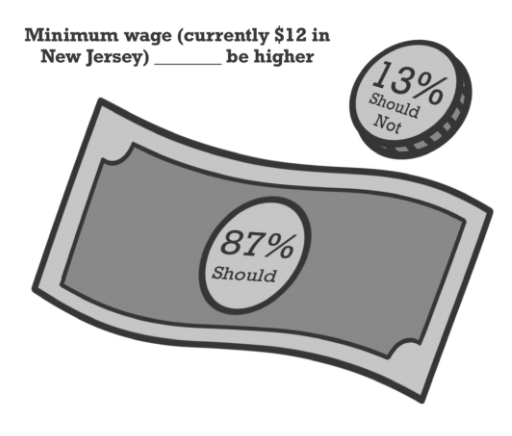Will raising the minimum wage help or hurt the economy?

BLOT GRAPHIC BY VIOLET LONGBONS
A survey of 54 students from Feb.3 to Feb.10.
March 12, 2021
Minimum wage is always a hot topic when it comes to American politics and economics. In every debate there is one question that prevails over all others, and for obvious reasons too: is it better to have a higher or lower minimum wage? Each side has provided valid and persuasive arguments to their cause, but never has society reached a general consensus.
Those arguing that the minimum wage should be lowered make the claim that a lower minimum wage
provides more job opportunities and vice versa. They believe that while raising the minimum wage may increase economic growth in America, it will force businesses to lay off employees, as they may not be able to afford paying the same amount of employees who are now sporting a much larger wage.
According to Britannica, the Congressional Budget Office projected that if the current national minimum wage was raised from $7.25 to $10.10, it would result in a loss of 500,000 American jobs.
Furthermore, the Congressional Budget Office also created a survey of 1,213 businesses which concluded that 38% of employers would lay off minimum wage employees if the minimum wage were to be raised. 54% of employers stated they would put a halt in their hiring process.
On the other hand, raising the minimum wage would result in an increase in America’s economic growth. The Economic Policy Institute stated that if the national minimum wage was raised from the current $7.25 an hour to $10.10 an hour, $22.1 billion would net positively into the economy.
So, what happens with this information?
After taking everything into account, a suitable course of action would be to raise the national minimum wage for a short period of time, say maybe five to ten years, and then later evaluate.
If the unemployment rate goes on a sharp incline after the raise, as predicted in studies, then it might be best for the wage to be reduced back to its previous. However, if the unemployment rate doesn’t go on a sharp incline, the economy begins to flourish and poverty numbers notably decrease, it’d be apparent that raising the national minimum wage was the correct step in solving the economic crisis in America.
The arguments from both sides are very persuasive and that’s certainly why this has been a controversial topic for decades. However, if a trial and error process can be effectively implemented, the answers to everyone’s questions may begin to follow suit.



